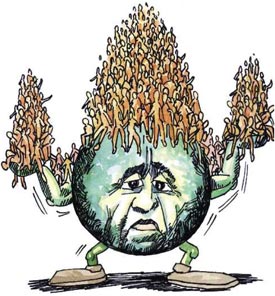News
Enlightening Our Self-Interest
Feb 10, 2009

This self-evident reminder is apparently not so self-evident to many. Or perhaps the real problem lies in perspective. We live our individual lives in the short term, whereas the life of our species is lived in the long term. And what satisfies exigent needs is often—possibly even usually—harmful in the long run.Myth: we have to save the earth. Frankly, the earth doesn’t need to be saved. Nature doesn’t give a hoot if human beings are here or not. The planet has survived cataclysmic and catastrophic changes for millions upon millions of years. Over that time, it is widely believed, 99 percent of all species have come and gone while the planet has remained. Saving the environment is really about saving our environment—making it safe for ourselves, our children, and the world as we know it. If more people saw the issue as one of saving themselves, we would probably see increased motivation and commitment to actually do so.
—Robert M. Lilienfeld, management consultant and author (b. 1953), and William L. Rathje, archaeologist and author (b. 1945).
The first farmers who planted a crop certainly found it preferable to going after a sabre-tooth tiger with a sharp stick for their dinner. Little did they know that introducing agriculture would lead to overpopulation, green revolutions, and factory farms that led to more overpopulation, genetically modified seed that led to yet more overpopulation, until, facing, by midcentury, the prospect of 9 billion human souls sharing a fragile planet with a rapidly diminishing host of fellow creatures, things began to seriously fall apart.
Understanding the ramifications of the long term should help us adjust our actions for the short term. And this will bring us to the understanding that our self-interest lies in maximizing the well-being of all human beings who share this overburdened globe with us.
Improved circumstances lead to fewer children, and overpopulation remains the prime challenge which the human species must overcome, and one which by itself is responsible for most of the other crises we face. Now that the western world has conquered the basics—clean water, safe food, decent education and health care, and a consensus on the need for a sustainable economy—it is time to extend these benefits worldwide, for the sake of our own survival.
If we focus only on our individual short-term well-being, we will fail to acknowledge the gathering tsunami of ignorance and want which in time will overwhelm us.
The Big Squeeze
Jun 29, 2008
 It took a million years for humanity to reach a population of one billion. It took 130 years to double that; 45 years to double it again; and, failing a catastrophe on the scale of the Black Death, it will take around 50 years to double it again to 8 billion by 2027 or so.1
It took a million years for humanity to reach a population of one billion. It took 130 years to double that; 45 years to double it again; and, failing a catastrophe on the scale of the Black Death, it will take around 50 years to double it again to 8 billion by 2027 or so.1
In the more developed countries, population is growing at the rate of two per minute; in the less developed countries, at 151 per minute.2
More than global warming, more than world terrorism, more than bird flu and HIV AIDS, the crunch of overpopulation threatens the stability and security of the world. There are simply too many of us for this poor planet to sustain, and peaceful means of applying the brakes to population growth must be found before there are so many of us that violent ones are forced upon us.
Many organizations are involved in the study of population growth and engaged in activities to ameliorate it. A few are listed below. If you believe others should be here, email us, and we will add them.
- United Nations Population Fund (UNFPA)
- Internationally funded source of population assistance for developing countries.
- The Population Council
- Seeking to improve the well-being and reproductive health of current and future generations.
- Population Action International
- Dedicated to advancing policies and programs that slow population growth in order to enhance the quality of life for all people.
- Population Research Institute
- Aims to educate the general public about the worldwide population control movement, its human rights abuses and racist foundations.
- Population Reference Bureau
- Informs people around the world about population, health, and the environment, and empowers them to use that information to advance the well-being of current and future generations.
- Population Resource Center
- Organizes programs that provide policymakers with population data.
- Worldwatch Institute
- Delivers the insights and ideas that empower decision makers to create an environmentally sustainable society that meets human needs.
Many of us won't be here in 2050; however, most of us—as well as our children and their children—will. What are you doing today to prepare that world for them? Do you think it's enough?
____________________
1 Source: First and second billion: Population Reference Bureau. Third through eighth billion: United Nations, World Population Prospects: The 2004 Revision (medium scenario), 2005.
2 Source: Population Reference Bureau, 2005 World Population Data Sheet.
Copyright © 2008 All Together Now.